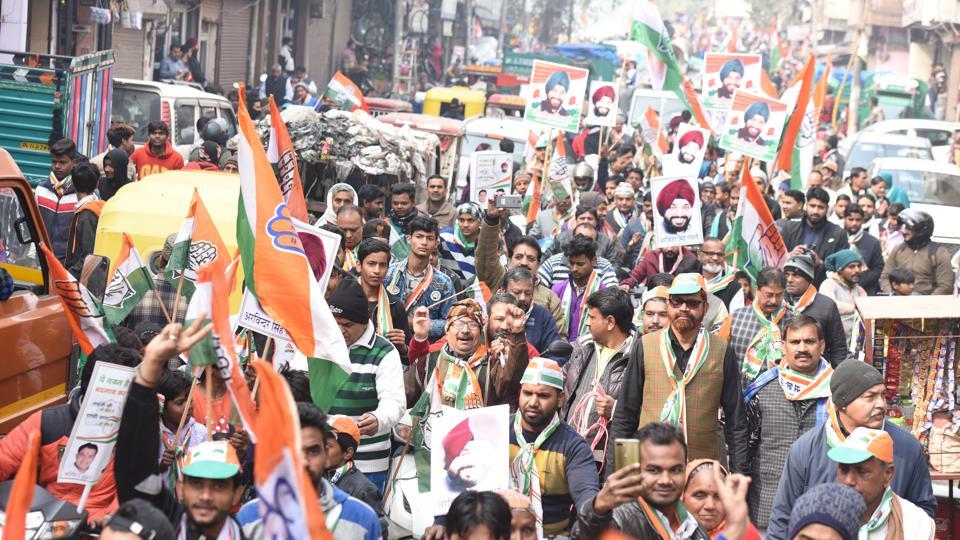
The Congress on Tuesday came up with its final list of five candidates, laying out its “best” cards for the February 8 Delhi assembly election.
Late on Monday, it had announced candidates for seven seats, including first-timer Romesh Sabharwal, who is pitted against AAP chief Arvind Kejriwal from New Delhi.
Tuesday’s list included Parvez Hashmi for the Okhla seat. A former Rajya Sabha MP and former transport minister in the Sheila Dikshit cabinet, Hashmi is one of the most experienced hands in the Delhi Congress.
The party brought back leaders such as Amareesh Gautam and Bhisham Sharma, who had earlier joined the BJP, to fight from their home turf — all with the aim to prove their political relevance in the national capital.
The candidate list included student leader Rocky Tuseed, who will fight from the Rajendra Nagar constituency. Tuseed, 25, the youngest candidate this election, is a resident of Dasghara village near New Rajendra Nagar. The party expects to cash on his “local connect” to face AAP’s Raghav Chadha and the BJP’s RP Singh.
Tuseed rose to fame in 2017 when he broke the five-year jinx of the National Students’ Union of India (NSUI) in the Delhi University by becoming the students’ union president.
Other Congress faces are Jai Prakash Panwar from Madipur, Mukesh Sharma from Vikaspuri, Parveen Rana from Bijwasan and Mohinder Chaudhary from Mehrauli.
Senior leaders said this election is do-or-die situation for the Congress. If the party does not manage at least a few seats, it will be the final nail on the coffin for a party that had till 2013 ruled the city for 15 years. In 2013, the party could win only eight seats and in 2015, 62 of out its 70 candidates had lost their deposits.
Along with Hashmi, the party fielded five former ministers in the Sheila Dikshit (former three-time Delhi chief minister) government—Arvinder Singh Lovely from Gandhi Nagar, Krishna Tirath from the reserved constituency of Patel Nagar, AK Walia from Krishna Nagar, Narendra Nath from Shahdara and Haroon Yusuf from Ballimaran.
“We have always taken it (candidate selection) seriously and these elections mean all the more to us because last time we ended up with no seats. This is our chance to redeem ourselves,” a senior All India Congress Committee (AICC) member said.
The Congress leader explained that Lovely, despite his brief stint at the BJP, has held multiple portfolios, from education to transport and urban development, and has been a three-time legislator from the Gandhinagar constituency, between 1998 and 2013.
The party is pinning their hopes on Lovely looking at his performance in last year’s parliamentary elections. Despite facing a strong candidate, Atishi, from East Delhi, Lovely managed to secure the second position after the BJP’s Gautam Gambhir.
Despite their age and near retirement from active state-level politics over the last five years, 74-year-old Narendra Nath and 71-year-old AK Walia were chosen from Shahdara and Krishna Nagar primarily because of their experience and connect with the voters.
Nath will be fighting from his home turf. Walia will face AAP’s sitting MLA SK Bagga and BJP’s Anil Goyal.
While in some areas the grand old party is relying on the experience of candidates, in others they are banking on youngsters.
“We have a solid line-up in all of our seats. Wherever there is a chance of winning a seat, against a relatively underperforming AAP MLA, we have fielded a popular face,” a Delhi Congress leader said.
“The Congress has applied the best strategy but this is not surprising. The Congress as a party is lying very low and even if they win one or two seats this time, it will be an improvement. So, if a candidate wins it will be because of the candidate and not because of the party. That is the reason they had no option but to rely on heavyweights,” said Sanjay Kumar, director at the Centre for the Study of Developing Societies.
In 2015, the Congress was the worst affected by the AAP wave and scored a duck. Both parties share a similar vote base and this makes them a direct competition for each other in the February 8 polls.